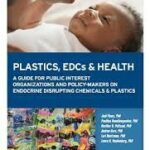Plastics, Endocrine Disrupting Chemicals and Health: Findings of a New Joint Report of the Endocrine Society and IPEN
March 31, 2021 @ 9:00am (AKDT)
 Plastics, and the endocrine disrupting chemicals (EDCs) they contain, pose a significant, global public health threat. Exposure to EDCs can be linked with human diseases and conditions including cancer, diabetes, reproductive disorders, neurodevelopmental impairment, and immune system suppression. The report from the Endocrine Society and International Pollutants Elimination Network (IPEN) entitled Plastics, EDCs & Health presents over 20 years of research on the adverse human health effects of plastics and the EDCs they contain. During this webinar, two of the authors – Drs. Flaws and Vandenberg – present some of their key findings and recommendations for actions needed to protect people and our environment.
Plastics, and the endocrine disrupting chemicals (EDCs) they contain, pose a significant, global public health threat. Exposure to EDCs can be linked with human diseases and conditions including cancer, diabetes, reproductive disorders, neurodevelopmental impairment, and immune system suppression. The report from the Endocrine Society and International Pollutants Elimination Network (IPEN) entitled Plastics, EDCs & Health presents over 20 years of research on the adverse human health effects of plastics and the EDCs they contain. During this webinar, two of the authors – Drs. Flaws and Vandenberg – present some of their key findings and recommendations for actions needed to protect people and our environment.
Key findings in the report include:
- One hundred and forty-four chemicals or chemical groups known to be hazardous to human health are actively used in plastics for functions varying from antimicrobial activity to colorants, flame retardants, solvents, UV-stabilizers, and plasticizers.
- Exposure can occur during the entire life span of plastic products, from the manufacturing process to consumer contact, recycling, to waste management and disposal.
- EDC exposure is a universal problem. Testing of human samples consistently shows nearly all people have EDCs in their bodies.
- Microplastics contain chemical additives, which can leach out of the microplastic and expose the population. They can also bind and accumulate toxic chemicals from the surrounding environment, such as seawater and sediment, functioning as carriers for toxic compounds.
- Bioplastics/biodegradable plastics, promoted as more ecological than plastics, contain similar chemical additives as conventional plastics and also have endocrine-disrupting effects.
Plastics, EDCs & Health report webpage and pdf – https://www.endocrine.org/-/media/endocrine/files/topics/edc_guide_2020_v1_6chqennew-version.pdf
Endocrine Society website – https://www.endocrine.org/
IPEN website – https://ipen.org/
Study cited by Dr. Vandenberg – Calafat, A. M. et al. Exposure to bisphenol A and other phenols in neonatal intensive care unit premature infants. Environ Health Perspect 117, 639-644 (2009).
This joint report of the Endocrine Society and IPEN provides the current best knowledge about the effects of endocrine-disrupting chemicals on human health.
Featured speakers
Dr. Jodi Flaws, lead author of this report, is a professor of comparative biosciences in the College of Veterinary Medicine at the University of Illinois at Urbana Champaign. The Flaws Laboratory team researches the genetic and environmental factors that affect the female reproductive system.
Dr Laura Vandenberg is an Associate Professor at University of Massachusetts Amherst’s School of Public Health and Health Sciences with research focused on the effects of chemical exposures during early life stages on health later in life.
